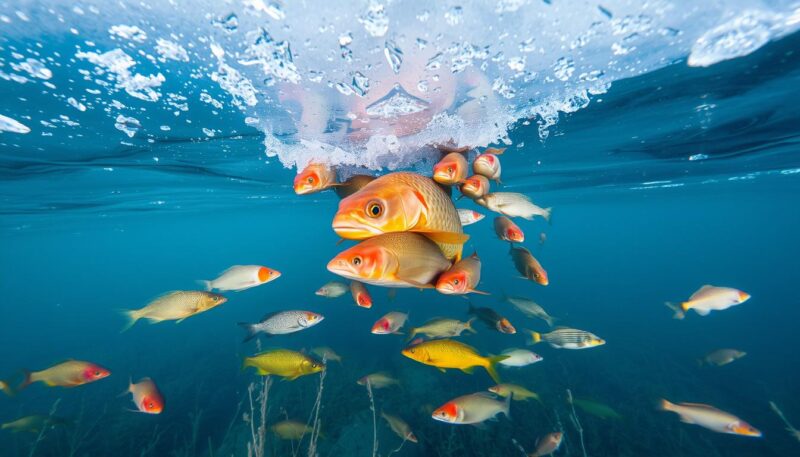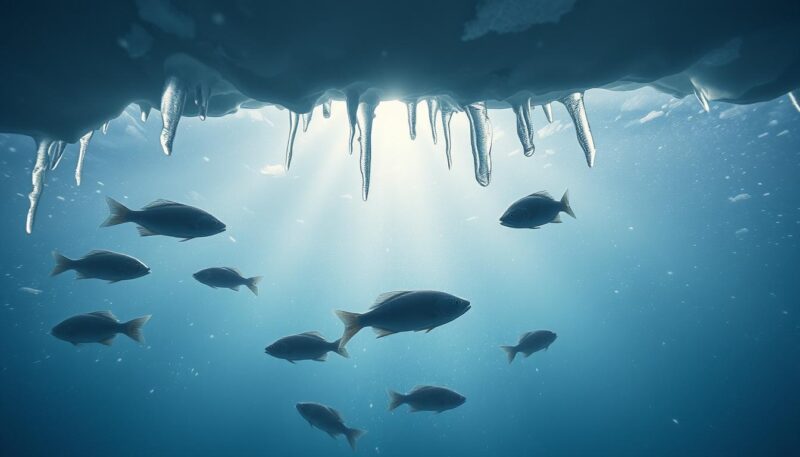As winter approaches and temperatures drop, many people are left wondering, do fish freeze in winter? The answer might surprise you. These fascinating creatures, being cold-blooded, have developed remarkable adaptations that allow them to persist in frigid conditions. Unlike mammals, fish do not regulate their internal body temperature; rather, it aligns with the surrounding water, raising unique questions about how fish survive winter’s harsh grip.
In the brisk depths, fish employ various survival strategies to navigate the challenges posed by low temperatures. Understanding their metabolic adjustments, oxygen needs, and behavioral changes shed light on the incredible resilience of these aquatic animals. Throughout this article, you’ll explore the mechanisms fish rely on to thrive even in icy waters and discover the science behind their survival tactics. If you’re intrigued by how fish adapt and the strategies used to flourish in cold temperatures, keep reading, as we dive into the underlying biology of these remarkable underwater beings.
What Happens to Fish in Cold Water
When temperatures plummet, fish undergo significant physiological changes that impact their behavior and survival. Understanding these adaptations is essential for appreciating how fish navigate the challenges of winter conditions.
Metabolism Slowdown
The metabolic functions of fish slow down considerably as the temperature drops. This reduction affects their heart rate and diminishes their need for food and oxygen. In winter, fish still consume food, but their intake is markedly lower compared to warmer months. Many winter fish species, such as trout, manage to survive longer between meals, adapting to the scarcity of available resources.
Breathing Difficulties
Cold water can cause damage to fish gills, which leads to breathing difficulties. Additionally, thick ice covering the water’s surface hinders oxygen diffusion, jeopardizing fish survival in winter. Without proper oxygen levels, fish populations can suffer drastically, as mortality rates may rise from suffocation. Some fish species adapt by seeking habitats with stable conditions, ensuring they have access to the oxygen they need.
Impact on Fish Population
The harsh winter environment impacts overall fish populations. A lack of open water areas for spawning means fewer young fish may be produced, further endangering the balance of aquatic ecosystems. The formation of ice can create challenges such as decreased habitat quality and increased competition for resources, leading to potential declines in certain species. As you explore fish behavior in cold water, it becomes clear that the conditions of winter pose ongoing challenges but also showcase the resilience of aquatic life.
Do Fish Freeze in the Winter?
Fish have developed remarkable adaptations that allow them to survive the frigid temperatures of winter waters without freezing. As cold-blooded creatures, they rely on their environment to regulate their body temperature, utilizing specific strategies to endure harsh conditions. Understanding how fish adapt winter enables you to appreciate their resilience and prepare for successful cold water fishing.
Cold-Blooded Adaptations
Fish adapt to cold environments through unique physiological changes. For instance, many polar fish produce antifreeze glycoproteins that effectively inhibit ice formation within their bodies. These proteins allow fish to thrive in seawater temperatures, such as Arctic and Antarctic waters that often drop below their blood freezing point of around 30.4°F (−0.9°C). These adaptations underscore the evolutionary resilience of fish species, particularly in extreme environments.
Surviving Under Ice
Fishing in frozen lakes poses challenges, yet fish remain active beneath the ice. Ice thickness can provide insulation, allowing the water layers below to maintain a stable temperature conducive to fish life. Furthermore, the phenomenon of lake turnover ensures oxygen circulation, essential for the survival of aquatic organisms during winter. This natural cycling of oxygen-rich water creates an environment where fish can remain viable, leading to effective winter fishing tips for anglers seeking success despite freezing conditions.
Species-Specific Survival Tactics
Different fish species employ varied survival strategies that reflect their unique environments. Some fish, like baitfish, seek refuge in vegetative cover to escape predators and maintain warmth. Others, such as certain catfish, bury themselves in mud to endure low temperatures. These behavioral adaptations highlight the diversity of survival tactics among fish species. Understanding these nuances can significantly enhance your approach to cold water fishing, especially when targeting specific species known for their unique winter behaviors.

| Fish Species | Adaptation Strategy | Environment |
|---|---|---|
| Arctic Cod | Produces antifreeze proteins | Arctic waters below freezing |
| Antarctic Toothfish | Stores high levels of salt in fluids | Antarctic waters |
| Baitfish | Finds shelter in vegetation | Frozen lakes with vegetation |
| Catfish | Buries in mud | Various freshwater environments |
Conclusion
In summary, fish demonstrate remarkable adaptations to survive in the frigid waters of winter. While they might encounter treacherous conditions, such as ice formations in environments like McMurdo Sound, these cold-blooded creatures rely on specialized proteins to prevent complete freezing. The antifreeze proteins, first identified in the 1970s, showcase nature’s ingenuity, allowing fish to endure temperatures that hover around minus 1.9 degrees Celsius without succumbing to the effects of ice.
Understanding the intricate relationship between fish and their icy habitat is vital for anglers interested in ice fishing. As you explore frozen lake fishing opportunities, keep in mind that fish behavior changes significantly during the winter months. Recognizing these changes will enhance your strategies for tracking fish movement in winter, leading to a more successful and connected experience with the aquatic environment.
Ultimately, as research continues into how fish cope with extreme cold and the fascinating role of antifreeze proteins, those who venture out in search of winter fishing can deepen their appreciation for these resilient species. By integrating this knowledge into your seasonal fishing endeavors, you can forge a stronger bond with both the fish and their unique winter habitat.

